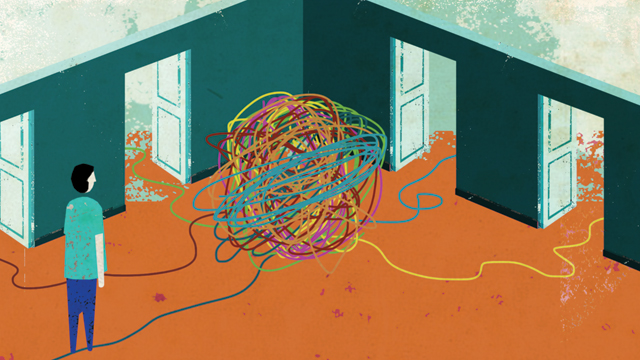This is my secret: My mother is a compulsive hoarder.
For years I didn’t tell anyone except my husband. Even my closest friends knew only vaguely of my mother’s “issues.” Then, a few years ago, a series of crises pushed the toll of my mother’s hoarding beyond my limits. Suddenly I found myself not only responsible for hiding her habit from the public eye — something I’d done since childhood, believing I could protect her from judgment — but also in charge of finding a cure for the nasty parasitic mite I’d caught while cleaning out her house. The mite had then inadvertently spread to most of my immediate family. Keeping her hoarding a secret was making it impossible for me, and now my family, to live comfortably in our own skins.
Desperately searching for someone who might understand, I joined an anonymous online support group for children of hoarders; it turned out there were a lot of us. And almost all of us were so ashamed of our parents’ mental illness that we told practically no one else about it. We wanted to protect our moms and dads, we wanted to be “good” daughters and sons, we were ashamed of the squalor of our childhood homes, we were afraid of being judged. Being part of the group helped me immensely. So much so, that after a while, I began to reconsider my secret. What was I losing by keeping it? And what could I gain by coming clean?
The answer to both questions was the same: a lot.
Keeping secrets hinders our ability to be truly intimate with friends and mates.
Keeping secrets hinders our ability to be truly intimate with friends and mates. Case in point: Whenever I was in a group of people and the topic turned to childhood, especially mothers, I would feel my face flush and I’d try to change the subject. For fear of people learning about my mother’s mental illness (which I also assumed would place my own perceived mental health in question), I said nothing about her at all. But by keeping parts of my personal history under such tight rein, I also had to rein in myself. Constantly. This made it impossible for me to ever feel truly at ease in my friendships, and led to chronic anxiety.
Holding on to a secret costs us physically, as well. Cloaking important facts is stressful. Chronic stress increases cortisol and adrenaline levels — two hormones that cause inflammation and damage the immune system. These are high prices to pay.
All types of secrets can produce these results: everything from surreptitious eating and hidden debt to telling or concealing a lie. Even seemingly small pieces of “secret” unfinished business like unwritten thank-you notes or unreturned calls can tax your body and emotions in myriad ways. It’s only by shining light into these shame-shadowed nooks and crannies that you can safely avoid their stress-related consequences. And it’s not that difficult — really — once you take that first step.
1. Unfinished Business
Self-proclaimed workaholic Lee Kravitz spent decades focusing on his career, rising to editor-in-chief at Parade magazine — and then he was fired. Shortly afterward, 10 boxes of stuff he’d abandoned at his office arrived on his doorstep. As Kravitz sorted through the letters, photographs and other keepsakes, he found some less-welcome memories: unpaid debts, unmourned relatives, unkept promises.
“I experienced this deep regret,” he recalls, “and the kind of ache that comes with knowing that you have not made good on some of the wrongs you’ve committed in your life.”
Kravitz resolved to spend the next 12 months making things right. He began with a single goal: finding his long-lost Aunt Fern. As a child, he’d been very close to her, but he’d lost track of his aunt after she was institutionalized as the result of schizophrenia. They hadn’t spoken in 15 years, and Kravitz had no idea where she was.
After considerable research, Kravitz was able to find Aunt Fern and throw a 67th birthday party for her at her living facility. He was the first visitor she had had in 15 years. “When I found her, it was one of the strongest and most cathartic experiences of my life,” he says. “And I rediscovered a part of myself that I had forgotten: that empathetic side, the caring side.”
Kravitz made a list of nine other important tasks he wanted to complete, including repaying an overdue debt, letting go of a grudge and finding a spiritual mentor, and he pursued each of them. (He writes about his experiences in Unfinished Business: One Man’s Extraordinary Year of Trying to Do the Right Things.) During the process, he realized that fear was at the root of each of his impediments. For example, he didn’t send a condolence card to a friend whose daughter had been killed because he was “afraid of not saying the right thing or interrupting his grief or sounding trivial.”
You’ll often find the kind of fear Kravitz describes — the anxiety about what others are thinking, better known as shame — behind secrets and unfinished business. A 1996 study published in the Journal of Personality and Social Psychology found that “when feeling shame, people felt more intensely scrutinized by others, and they focused more on others’ thoughts (as opposed to their own thoughts) about themselves than they did when they were feeling guilt.” According to this study, guilt can motivate people to take corrective action. Shame, on the other hand, tends to paralyze.
Small, concrete steps helped Kravitz break through his shame:
1) he wrote lists of his unfinished business;
2) he confronted his fears in a journal;
3) he reached out to people with letters and phone calls;
4) he found ways to make amends; and
5) he spent time reflecting on each experience.
Kravitz recommends this five-step process to anyone addressing unfinished business, and emphasizes the importance of following all five steps — if you don’t confront your fears, you can’t reach out. If you don’t reach out, you can’t make amends.
Following through can provide unexpected rewards, which Kravitz describes in his book: “When I did take the time to reach out with compassion, and persevered, something remarkable would happen. I wouldn’t only right a wrong, I would reconnect with parts of myself that I’d forgotten.”
2. Denied Reality
When Casey Scott’s husband was arrested and charged with attempted murder and sexual assault soon after their wedding, he denied the charges and she believed him. He was acquitted.
The marriage grew rancorous and the couple soon parted. During their initial separation, Scott received a pleading call from her ex and went to his house one night to talk. “Things got ugly,” she recalls. He attacked her.
Ashamed that she’d married such a man in the first place, Scott never reported the assault. Soon after that incident, her ex-husband assaulted another woman and was again arrested. When she was questioned by the police about whether her ex-husband had ever been violent with her, ashamed, Scott lied. Still, he was convicted and sentenced to 20 years in prison.
When he appealed his case, she was called in for questioning and repeated her claim that he’d never been violent with her. But as she was preparing to leave the police station, she suddenly reconsidered. “All of the guilt and anger and fear I’d felt over the years flooded out, and I spilled the entire story.”
She later testified against him in court. “When I was able to look him in the face and tell the courtroom what had really happened, it allowed me to finally start the healing process.”
Scott’s story shows that revealing a hidden truth can have important positive consequences for both the person who does the revealing, and for others. Still, that doesn’t make it easy. The good news is that you can start slow.
When you’re preparing to come clean, “Write about it in a journal, or even create art or music about it,” says Michael Finkelstein, MD, medical director at SunRaven, a holistic healing center in New York. Try role-playing the difficult conversation with a confidante. If you don’t feel comfortable divulging the secret to someone you know, seek professional help. Licensed therapists are sworn to codes of confidentiality.
Psychotherapy can help with related issues. As Kravitz points out, people often don’t speak up because they’re too ashamed to do so. Therapy can help address the root causes of shame so that confessing a lie doesn’t just become one more opportunity for self-loathing. Even if your feelings about the core issue are mixed, therapy can help you take satisfaction and comfort in being honest with yourself.
3. Clandestine Eating
Secret eating usually occurs as a consequence of shame about what or how much one is eating, says psychotherapist Karen R. Koenig, LCSW, MEd, author of Nice Girls Finish Fat. “Secret eaters are often perfectionists, people who hold themselves to very high standards, and feel they have to be ‘perfect’ eaters,” Koenig explains. Since perfect eating is unattainable, what secret eaters perceive as “imperfect” behavior — usually eating less-than-healthy foods — ends up going underground. Often, it results in bingeing.
Kathlyn Hendricks, PhD, cofounder, with her husband, Gay, of the Hendricks Institute, a conscious living center in Ojai, Calif., kept up a pattern of clandestine eating for years. She writes about the experience in Conscious Loving: “I had to lie to myself about what I was doing, not see how heavy I was, and withhold my full energy from Gay so that I could protect the secret.”
After her husband confronted her about her weight, she decided to tackle the decades-old pattern head on. “I began telling the immaculate truth to Gay about every aspect of my weight: body image, history, embarrassment, dreams, everything I could think of. Telling the truth gave me real support for keeping my agreement with myself to transform my body.”
Telling the microscopic truth “has tremendous healing value,” says Hendricks. It’s more than just an antidote to perfectionism and secret-keeping, she notes. Her personal revelations increased the intimacy of her partnership. Ultimately, the self-confidence and clarity she experienced flowed over into all areas of her life. “My work deepened, money flowed more easily, and my relationship with my son became even more fun.”
Another way to end a pattern of secret eating is to simply bring more awareness to the act. “If you pay attention to when you are hungry, what your body wants, what you are eating, [and] when you’ve had enough, you can end the obsession, because obsessions and awareness cannot coexist,” writes Geneen Roth in Women Food and God.
Roth offers several guidelines, including eating while sitting down in a calm environment, eating in full view of others — without distractions — until you’re satisfied and, perhaps most important, eating with “enjoyment, gusto and pleasure.”
4. Family Shame
Nancy Fagan, MFT, owner of the Divorce Help Clinic in San Diego, was in the midst of launching her relocated business in 2009 when suddenly her name was splashed all over the local newspapers. The headlines revealed a dark secret she and her family had been keeping for two decades: Her father was a murderer.
Police had identified Fagan’s estranged father as the prime suspect after the 1989 killing, and she and the rest of her family knew he was guilty. They willingly cooperated with the police on the case, but there wasn’t enough evidence to convict him. Twenty years hence, with the help of DNA found on a glove, he was, however, finally arrested and is currently on trial.
Fagan was terrified that she’d be judged for her father’s crime, but today she says she’s glad it’s out in the open. “The reactions from people were so heartfelt, it was unbelievable,” she says. “They did not judge me. They knew me as an individual person — that part was truly a relief.”
That’s not surprising, says Marv Seppala, MD, chief medical officer at Hazelden, an alcohol and drug addiction treatment center in Center City, Minn. “Getting a secret out can allow us to be more natural again — because we can’t just hide the one thing, so to speak. We’re dampening down other aspects of our persona, too. Over years of not being yourself, you’re insulated from who you really are. That’s a horrible way to live life — it undermines a lot of joy and happiness.”
The first step to unburdening yourself of another’s secret “is to stop personalizing it,” says psychologist Elizabeth Lombardo, PhD, author ofA Happy You: Your Ultimate Prescription for Happiness. “It’s the other person. It’s not you.”
And when you’re ready to share your story, she says, “Choose someone you feel very comfortable with and set the stage for an important conversation. If they had a stressful, long day, that’s not the time.”
She also advises trying to identify something positive you can take away from the experience. Maybe you discover your own inner resilience, or learn that you’re uniquely capable of helping other people in the same situation, or you can now feel compassion for people you once might have judged.
5. Secret Debt
Jill, a life coach in California who asked that her real name not be used here, is hiding a secret from her mentor. She owes $15,000 to various credit-card companies. She accrued the debt while pursuing a graduate degree and a career change. “I kept thinking that as soon as I get a job, I’ll be able to start paying off the credit cards,” she says. “And I kept justifying spending, because if it was anything that would put me closer to a job, it seemed OK.” Conferences, books, clothes for job interviews all went onto the credit cards.
She says she’s hiding her debt from her mentor because, “If he knew that I was in debt, he would lose respect for me, and he wouldn’t refer anyone to a coach that he didn’t respect.”
It’s a common scenario, says Bari Tessler, MA, financial therapist and founder of Conscious Bookkeeping in Boulder, Colo. Tessler advises people who are holding on to secret debt to evaluate the underlying emotions. Do you feel you “should” have more money than you do? Are you spending money on things you don’t want anyone to know about because you fear the judgment of others?
Exploring underlying emotions is especially important in the case of one spouse hiding debt from another. “Usually there is something else going on in the relationship, and this is where the person is acting out. They don’t feel love or connection, or they don’t feel powerful,” says Tessler.
Not surprisingly, secret debt and secret eating are related on a biochemical level. “Overeating and overspending both trigger the release of dopamine, which is the feel-good neurotransmitter,” explains Koenig. “And you know, hey, if it feels good, it’s hard not to do it over and over — especially if you don’t have enough dopamine or other neurotransmitters in the right balance.”
That’s not to say the patterns can’t be broken, though. Tessler recommends what she calls a “body check-in” while reviewing your credit-card statements and writing down the amounts: “What are you feeling: Are you angry? Are you sad? Are you scared? Getting in touch with the feelings helps bring more awareness to that moment and begins the process of change.”
And take a look at how the pattern developed, she adds. “Maybe you saw your mother stuffing away cash, or maybe she even said ‘a woman always needs to have her own money.’”
After you’ve worked out exactly how much you owe, Tessler suggests that you calculate your income, expenses and how much money you can realistically allocate each month toward repayment. She adds this caveat: “If this is something you are hiding from a spouse, you may want a third party to help, a money coach or a financial therapist. The underlying issues need to be brought up in a safe place.”
Your credit score and your relationship will reap long-term benefits from coming clean and taking care of your finances. “If you can come together and be honest and transparent, you develop more compassion for each other,” Tessler says. “It will deepen the intimacy in your relationship if you can share it all.”
Someone to Tell
If you’ve decided to divulge a stressful secret, choose your listener wisely. Here are a few tips that can help make your revelation a positive experience:
- Choose someone who you know from past experience is open-minded, nonreactive, nonjudgmental and trustworthy.
- Choose a good listener, someone who will be willing and able to give you his or her full attention.
- Select a time and place where you know you’ll both feel safe and comfortable, and have adequate privacy.
- Take the other person’s obligations and affinities into account. You may not want to expose sensitive information to someone who can’t resist telling her husband everything.
- You also don’t want to confide in someone with divided loyalties who may end up in a compromised position as a result.
- Keep in mind that therapists and clergy are sworn to codes of confidentiality. If your secret doesn’t involve potential harm to another person, it’s safe with them.
- If talking with someone you know isn’t an option, consider an anonymous support group — online or in your community — that suits your situation.
For a list of online support options for everything from financial challenges to self-injury, visit www.dailystrength.org.




This Post Has 0 Comments